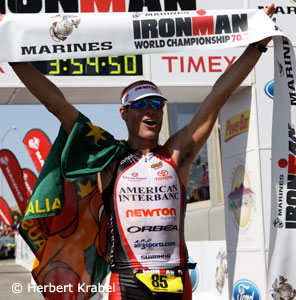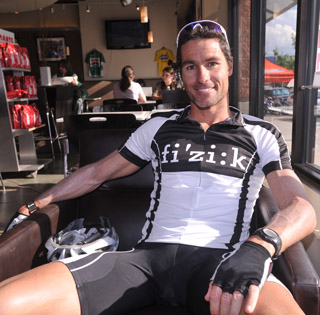Vegas win boosts Crowie’s Kona stock
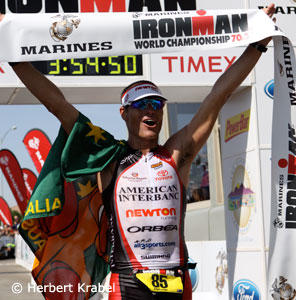
After a disappointing early season day at the Abu Dhabi International Triathlon and suffering a debilitating virus in April that led cost him months of recovery (including a broken rib from coughing) two-time Ironman World Champion Craig Alexander got back in gear with a dominating, fast win at Ironman Coeur d’Alene. But the most encouraging news this year for the 38-year-old was a 3 minute, 15 seconds margin of victory over Chris Lieto at the Ironman 70.3 World Championship in Henderson Nevada earlier this month.
At Las Vegas, Alexander had an aggressive 4th-fastest bike on a tough, hilly course that gave away little to three men and put time on a host of fast runners. But the greatest news came when that effort on the bike left him with plenty of energy to blow away the field on the run. Buoyed by his performance, Alexander says he is ready to alter his old winning formula at Kona and push hard on the bike to keep his most dangerous rivals on a shorter leash before he starts the run.
This interview with Alexander was conducted by telephone from his hotel in Kona.
Slowtwitch: What did your win at Las Vegas mean to you?
Craig Alexander: For sure, it is always meaningful to win a world championship and it was nice to win my 4th world title. It meant a lot because it’s a distance I think I’m best at, and I haven’t been able to contest the 70.3 World Championship for several years. I also think it is very nice to have won two world titles at both distance, the 70.3 (2007 and 2011) and Ironman (2008 and 2009).
ST: Why couldn’t you race both events in 2009 and 2010?
Craig: After I started winning in Kona, my family and I went back to Australia after the race and I got very busy with sponsors and media so it was not possible to go back and race at Clearwater at the high level I demand of myself. But when the WTC announced a schedule change, I was excited because I always raced 70.3s in good form coming down from altitude a month out from Kona. And because I heard it was a hard course, I got super excited because it suited me very, very well. Then I had a great race.
ST: Was it extra meaningful this year because the Las Vegas course was so demanding and conditions were windy and hot?
Craig: It was a true world championship course for that reason. This year it was a non wetsuit swim, a very hilly bike and hilly run with heat and wind which made it true championship test. My first world title in 2006 at Clearwater showed I could win in a wetsuit swim, a fast bike and a fast run — a completely different kind of course. I believe these two championship wins underline my versatility and prove that I am consistently strong on all courses and in all conditions.
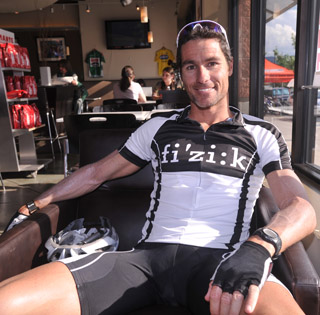
ST: What is your perspective on your swift bike split? [Alexander’s 2:14:47 bike split in Las Vegas was 4th fastest – 4:11 slower than runner-up Chris Lieto, 1:49 slower than 4th place Michael Weiss and 3 seconds slower than 8th place Tim Berkel. But Alexander put time on swift runners like Joe Gambles (22 seconds), 58 seconds faster than Paul Matthews, 2:45 faster than Raynard Tissink, 9 minutes faster than Andy Potts and 6 minutes faster than Filip Ospaly] People have long said you are weak on the bike?
Craig: It was probably better than any bike split I’ve done in a long time for a number of reasons. I always go into every race with the strategy to swim as near to the front as possible. Obviously I do not swim at the front when Andy Potts is there. And then the plan is to set up the race on the bike.
ST: After that bike split, you uncorked a race-best 1:11:51 run – 1:42 faster than anyone else and, because of the formidable hills, I think equally impressive as Michael Raelert’s 1:09s in Clearwater. So it seems your strategy, combined with a stronger bike, worked out?
Craig: I think it worked out well in Las Vegas. I was second or third starting the run. Of course every race is different – and people fail to understand triathlons always end with the run. I have been lucky to have had a lot of success winning races on the run. But at the same time many professional triathletes get pigeonholed. People have labeled me as weak on the bike. But look at my other races. Laguna Phuket and St Croix have tough bikes and I’ve won both.
ST: So how did you race Las Vegas? Was it any different than your classic strategy to save some energy for the run?
Craig: My classic strategy has been to hang with the main pack [not the breakaway leaders] on the bike and win it on the run. The reason is that the run is last discipline of the race, and I felt that was the best way to win the race. I don’t want to put an exclamation point on my performance in Las Vegas and say this is what I can do. But it does show that I can race different ways. It showed that I saw an opportunity on the bike to get an advantage on other good runners and I took it.
ST: Where do you think the criticism of your bike comes from?
Craig: I think a lot of criticism of my biking came from PAUSE I will single out Macca, who was very vocal about my bike. I don’t think he was specifically criticizing my bike so much as saying I am such a good runner there was no point for me to go hard until the run. I do not pretend to know all of Chris’s sound bites. But what I took from what I heard is that he was saying that I am such a good runner that he and the rest of the top men need to push somewhere else to make inroads. And that is what happened to me in Kona last year.
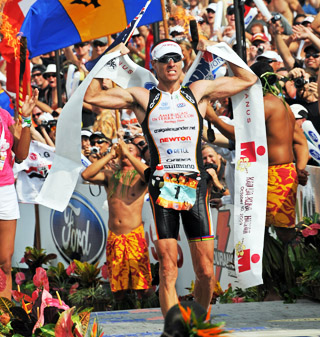
ST: Are you afraid of Andreas Raelert after he broke — by 9 minutes — the 14-year-old Ironman-distance race record set by Luc Van Lierde in 1997 at Roth?
Craig: I am highly respectful of his ability. Not just for that race. I put very little credence on that one race. Every course is different. But just looking at his time – it was amazing. Great athletes have raced on that course for 14 years since Luc van Lierde went 7:50:27. I have utmost respect for Andreas because he finished 3rd and 2nd in his first two years at Kona. And because he also won Frankfurt in 2010 and Challenge Roth this year. The guy is a formidable contender and a big factor – and so is Marino Vanhoenacker, who went 7:45 at Austria. But there are a bunch of guys who will be in the mix. Rasmus Henning, Eneko Llanos, Raynard Tissink and Chris Lieto have a good chance this year. I could mention another 5-10 guys who also have a good shot to be on the podium.
ST: How will you handle all these contenders?
Craig: I think the best thing to do is to stay on my own side of the street. I’m in the best shape ever going into Kona, and if I run a smart race, I can’t be worried.
ST: What is your fail-safe point coming off the bike?
Craig: Ideally I would be 3-4 minutes back after the bike. No question the gap got too large last year. Once that gap was established the guys in front had a good working alliance of convenience. The first main group included Macca, Andreas, Marino, Raynard and finally Dirk Bockel. Those guys were all good enough to get on the podium. I was a two-time champion and I think a lot of the focus in my group was on me. I think it will be different this year. I have to pay attention. Last year I thought we would give up 3-4 minutes. I was obviously worried about Andreas and Marino. But remember we still had Henning, Eneko, Cam Brown, Andy Potts and Terenzo Bozzone. I did not think our group would just watch me. And at 80 miles the lead group was just 2 and a half minutes ahead. That was not a fatal gap at that point. But it was later when everyone in our group surrendered. Maybe some of them had bad days. All in all we had a lot of firepower. But no one was willing to push as hard as they guys in front. And last year the conditions were one of the best ever.
ST: I take it that you prefer tougher conditions?
Craig: I do not really care. Of all the years I have raced Kona, the windiest was 2008, when I won my first victory. I am prepared for tough conditions or whatever it is. I like heat and wind — I have raced and done well in similar conditions in St Croix and Las Vegas where it was hot and windy. I think I must be prepared for all sort of conditions.
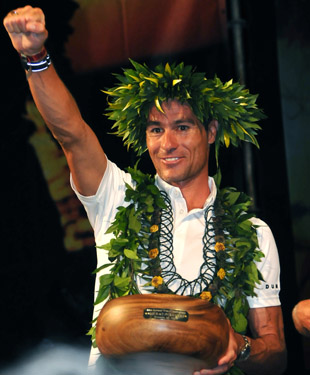
ST: Given the last minute sickness that has afflicted many favorites in the last few years, will you go around Kona wearing masks like the doctor in the movie Contagion ?
Craig: Half the battle is just staying healthy. Remember ’07? Six or seven of the top 10 men from the year before did not start or did not finish. Normann got sick, Cam Brown too, and Faris did not even start. Rutger Beke was injured and he was 3rd the year before. Before the gun went off, 6 or 7 guys were wiped out of the race.
ST: Have you changed to a different fit or position on the bike?
Craig: Obviously my position is a little different on a different bike in Vegas. [Alexander rode a Cervelo P4 in Las Vegas, but would not discuss the issue at this point]. The trend in triathlon is on improving all elements of the race – the swim, the bike and the run.
ST: Will you have a different strategy for the bike?
Craig: This year at Kona I have a different mindset on the bike. I am not prepared to give up as much time. I am willing to work harder on the bike. I was always capable of this. People criticized me but I was not about to change the recipe until other folks forced me to. But my game plan came unstuck last year. Macca was very canny about encouraging guys to push me on the bike. I think a lot of guys he convinced to work with him on the bike did not think he would be a threat on the run. He fooled them. But I always thought he would be competitive, even with good bikers. He was able to convince guys there was a mutual interest in this move. But in the end, his interests were best served.
ST: Is there an age ceiling you are bumping up against at age 38 when Mark Allen retired from Kona at age 37?
Craig: I think all of us are different. I do not look at or think about becoming the oldest to win Kona. I do not pay one nanosecond of attention to age. I do not give it any credence or thought that my race will be affected by age whatever performance I put in. If I do not win on October 8 it will not be because I am 38. I am in at least as good shape as any time I have come to this island. I think that issue is more interesting for other people, a record for whatever — the oldest or youngest to win. There is an old saying: If you are good enough you are old enough. I certainly won’t use my age as an excuse if things don’t go the way I want.


